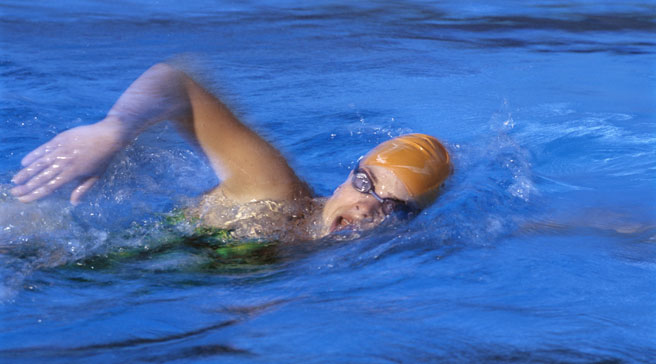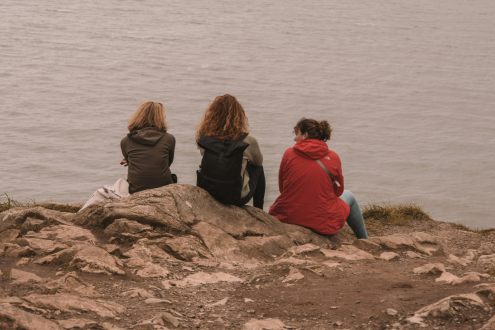The meditative power of swimming
Swimming isn’t just good exercise for the body, it’s also calming and restorative for the mind, says Anna Hunt

When I was 25, I went on holiday with my boyfriend to Cinque Terre, a protected marine reserve on the Italian Riviera. The relationship was not a good one, and the holiday was not a seamless week of intimacy.
However, one memory will always stay with me. We were on the beach, arguing about some triviality, and my parting shot was to walk away in a huff and dive into the sea. A couple of minutes later, my mood had changed completely.
Treading water in a clear, azure Mediterranean, craggy cliffs surrounding me, I felt a wonderful sense of wellbeing. As I swam further out and immersed myself in the salty water, this sense of contentment got stronger. By the time I returned to the beach, I couldn’t remember what the argument was about – let alone care who had won.
My experience was, I have subsequently learned, far from unique. Triathlete and personal trainer Daniel Parnwell ranks swimming in outdoor lakes and rivers as one of life’s most pleasurable experiences. One of the highlights of his next triathlon will be the 2km swim in Lake Verney in the Swiss Alps. ‘To prepare, we swim in the Thames at dawn,’ says Parnwell. ‘There is nothing like swimming up a mist-covered river, as the sun comes up. The light is amazing and you feel totally connected to nature.’
Swimming’s therapeutic qualities aren’t limited to the sense of wellbeing that comes from being outdoors, either. Despite the chlorine, there’s a certain feel-good factor that comes from swimming in a pool.
For Anna Goldrein, an online travel journalist from London, it’s all about what she describes as the meditative quality of swimming. ‘It’s a very peaceful form of exercise,’ she says. ‘I have a busy job, surrounded by people all day long. Going for a swim enables me to switch off from everything. I’m not being told what to do, like in an aerobics class, and I’m not being bombarded by stimulation as I am for the rest of my day. It’s just me and my mind moving through the water, which is very liberating, and because swimming is so rhythmical, it’s like doing yoga in water.’
Swimming can be even more relaxing if you learn the proper technique: graphic designer-turned-swimming teacher Karen Wilson teaches people to swim using principles drawn from the Alexander Technique, such as paying attention to body alignment in the water and breathing correctly.
‘People are hard on themselves when learning to swim,’ she says. ‘And teachers can pile on the pressure, too. My eldest son, Jo, had a horrific time when he started learning because the teacher was domineering and pushy, and he panicked. But water is a very calming element. I teach people to slow down and allow the water to support them. This makes swimming a much more calming and restorative form of exercise, and is particularly good when people are anxious in the water.’
It’s an approach that has revolutionised Wilson’s own approach to swimming. ‘My focus has changed. I used to just want to get in the pool, get my swim done and get out. Now I enjoy the experience a lot more – and I feel like I’ve done an hour’s meditation when I get out of the water.’
There’s another advantage of water exercise. When you’re working out in the gym, everyone can see you. But in a pool you become virtually invisible, so you’re not self-conscious.
Swimming is also one of the best all-round forms of exercise. Parnwell recommends his clients swim for at least one of their three weekly workouts. ‘It’s a very effective form of cardiovascular exercise,’ he says. ‘It’s good to alternate swimming with high-impact forms of exercise such as running. And because it’s non-weight-bearing, swimming is useful for rehabilitating injuries such as sprained ankles or strained muscles, without losing fitness, or simply to stretch and give the muscles a rest.’
Charlotte Maurissen is a professional triathlete-turned-personal trainer. She finds swimming particularly useful for new clients who don’t have an established exercise routine. ‘It’s a great way to get unfit people back into exercise,’ she explains. ‘Running for four hours is out of the question, but swimming enables someone to keep within their comfort zone while building up stamina. They can start by swimming a few lengths at a time, before moving on to a more demanding fitness routine. This gives them a sense of achievement, which is very motivating.’
Aside from exercise, why does being in water make us feel so good?
Much has been made of the amniotic qualities of being in water – its similarity to being in the womb is one possible explanation for why we feel so well after a swim, especially in the sea. The beneficial qualities of sea water have been observed for many centuries. In about 500BC, Hippocrates, the father of medicine, was the first to record its therapeutic qualities when he noticed the healing effects of sea water on the injured hands of fishermen. The sea water not only reduced infections, but patients who followed treatments involving the use of sea water found that it promoted pain relief.
It’s also believed that our bodies have the ability to absorb minerals, such as iodine, from the sea through the skin, and to release toxins back into the water. This is the principle behind thalassotherapy, a system of bathing in sea water (‘thalassa’ is Greek for sea). It’s employed to treat problems such as lack of sleep, poor circulation and cellulite. ‘I spent a week at a thalasso spa in Crete,’ says Stella Photi, a travel agent. ‘I wasn’t dieting, but I lost a few inches from my waist and hips because the treatments were so detoxing. Normally it takes me a couple of days to unwind during a holiday, but I slept like a baby from the first night. And at the end of the week I was glowing and relaxed.’
Water is so much more than a simple medium for exercise. Alexander McQueen, the late fashion designer, was quoted in Vogue as being ‘happiest when he was scuba-diving’. Underwater, he could be like Peter Pan, untroubled by the issues that plagued him on dry land. It’s a sentiment that all swimmers and water babies can relate to.
More inspiration:
Read Karen Ruimy on Meditation – Discovering your true self on LifeLabs
Read The call of silence by Mark Vernon on LifeLabs









